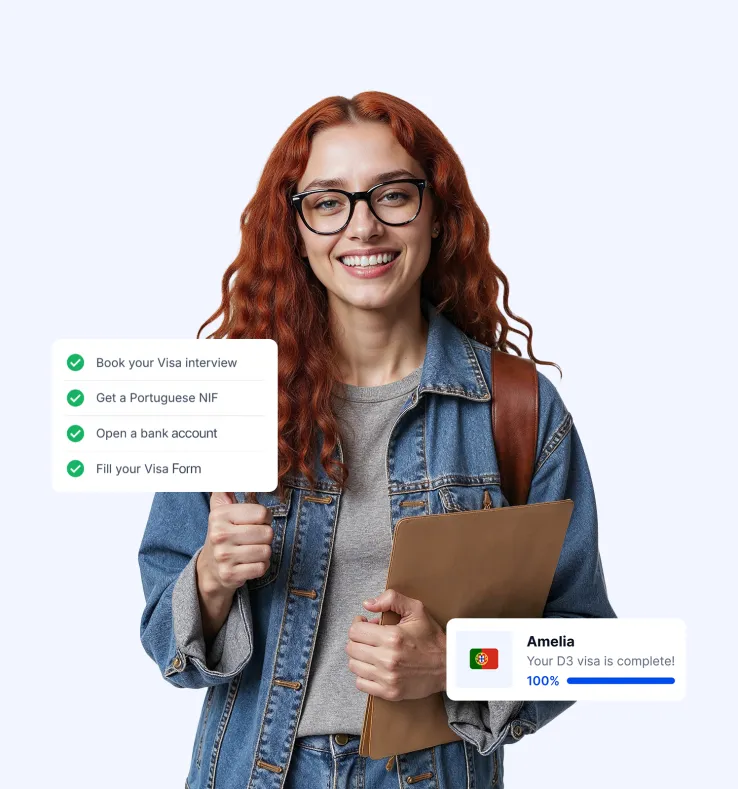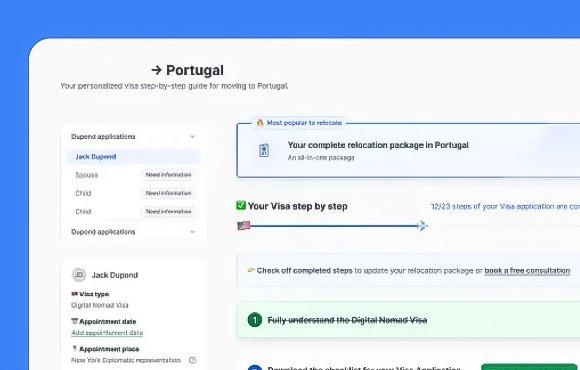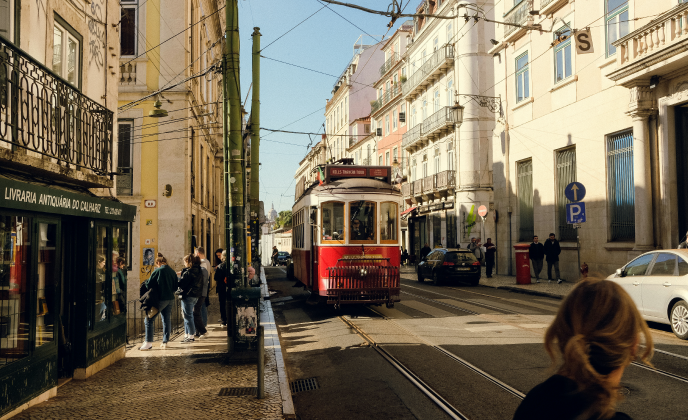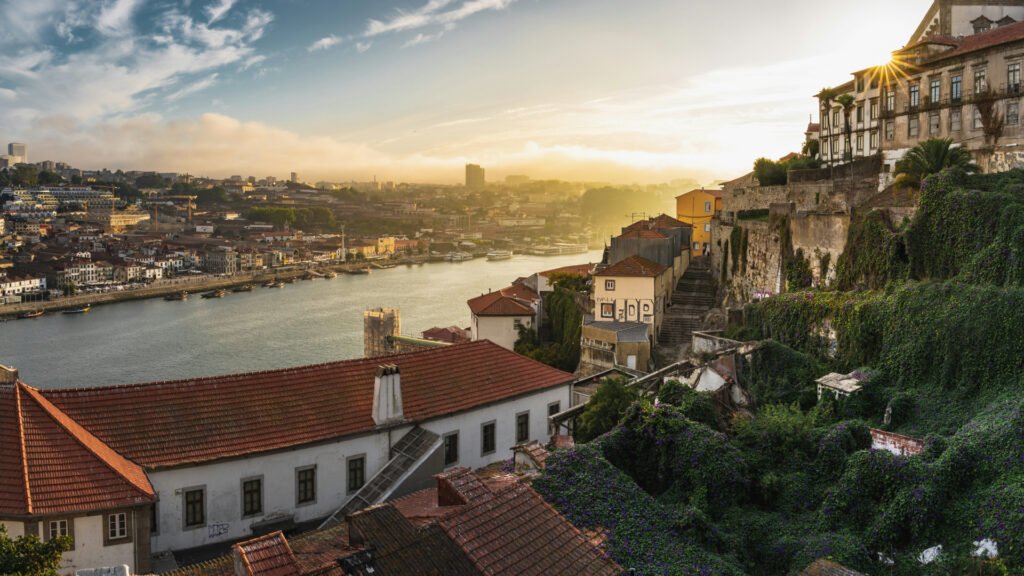Inactive
Simplifying IT
for a complex world.
Platform partnerships
- AWS
- Google Cloud
- Microsoft
- Salesforce
Unveil the complete guide to the D3 Visa for Portugal. Whether you are an academic or a specialist in your field, this visa facilitates your move to Portugal.





Processing time: 2 to 5 months*
*Highly depending of the processing times of the country in which you are applying.✅ Minimum monthly income: ~1.570€
💼 Highly Qualified Professionals
Non-EU citizens with advanced education or professional qualifications and a job offer or employment contract in Portugal for at least 12 months
📑 Cultural, Educational, and Scientific Activities
Professors, researchers, and cultural professionals with contracts or agreements to work in Portugal in roles of significant importance
👨🏽💼 Management and Leadership Positions
Experienced managers and senior executives with job offers specifying their leadership roles in Portuguese companies

Your annual wage must reach 3 times the IAS for each month ('Indexante dos Apoios Sociais' or Social Support Index), which in 2025 is 1x IAS = 522,50 euros. Or 1.5 x the Portuguese annual average wage.
In this case, the applicant's annual wage total must be 21.945,00 euros (equivalent to 14 salaries) if under IAS, or 18.270,00 euros if under the Portuguese annual minimum wage rule.
The IAS threshold, along with the Portuguese minimum wage, changes every year.I

This is not a recommendation but is a recommendation from our experiences.
For a single person, the value is the annual Portuguese minimum wage, 10.440,00 €.
If you have dependents, the threshold changes accordingly.
1. Your spouse or civil partner.
2. Your minor children (above 18 qualifies if enrolled in a Portuguese educational facility).
3. Dependent parents (when included at your tax return or under your care).
4. Anyone whom you or your spouse may have legal guardianship (like disabled children or family members under your care, siblings you may have legal guardianship, adopted children).

⚠️ A NIF will be required for your Visa application, to secure a place and to open a Portuguese bank account.
The NIF represents your Portuguese tax identification number. It's a simple and straightforward approach to identify yourself for tax purposes in Portugal. 💸
We recommend that you consider our Bank Account service in Portugal as a solution. 💸
Once you have fully established yourself in Portugal, you can easily create a bank account at any agency by providing ID, status in Portugal, proof of address, and income.
⚠️ It is essential to have the minimal annual threshold specified by your visa in a Portuguese bank account. Your visa won't be issued without it.
After submitting your visa application, there’s typically a wait time, which can extend for months. Use this period to prepare for your move and gather documents you'll need to present at your AIMA appointment when you arrive in Portugal.
Additionally, some offices may keep your visa interview documents, so be prepared to re-issue some before you go to Portugal.
⚠️ Ensure that you have all the necessary documentation in your home country: Leave a power of attorney in the name of a trusted person; bring copies of the main documents you may leave at home: birth and marriage certificates, house-owning titles, an extra copy of your POA, copies of vaccination cards, or anything else you may need at hand.
1. Insufficient funds.
2. Invalid position documentation.
3. Criminal record with annotations.
4. Documentation incomplete.
⚠️ If you need any clarification regarding the D3 visa application process, Lusolynk is here for you! We have a free consultation service where you can clear up any doubt.

1. Final Preparations: Finalize travel arrangements, inform relevant parties (e.g., tax authorities in your home country), and ensure all paperwork is in order, especially what you'll need to present to AIMA.
2. Check what you can take with you to Portugal. Some items may be forbidden due to their composition (like hoverboards) or may need a baggage certificate at your local Portuguese consulate (like kitchen appliances).
3. Upon arrival in Portugal, register your address with the local authorities (NIF address).
You must schedule your AIMA appointment during this 120-day period to convert your D3 visa into a residence authorization and provide the necessary documentation proving your settlement in Portugal and your ability to support yourself here in accordance with your visa requirements (values explained at the beginning of this article).
1. Biometric data collection (picture, signature, and fingerprints) and verification of documents.
2. Documents needed for the AIMA appointment: Bring all the documents you submitted for your visa application (with proof of accommodation updated if you decide to move and business proof if established or in the works), and add to that Portuguese health insurance instead of travel insurance.
⚠️ For the criminal record, you'll need to translate and notarize it (even if it's in your mother tongue).
All set? Just wait for your residence permit to arrive at home!
| Duration since issue | Maximum time you can be outside of Portugal | Renewal period | Renovation qualification |
|---|---|---|---|
| 2 years |
6 consecutive months, or; 8 non-consecutive months. |
End of 2nd Year | Residency card with 2 years |
| 2 years |
6 consecutive months, or; 8 non-consecutive months. |
End of 2nd Year (or 4th year in total) | Residency card with 2 years |
| 2 years |
6 consecutive months, or; 8 non-consecutive months. |
End of 2nd Year (or 6th year in total) | Permanent residency card |
Field Experience
Done Around World
Client Satisfaction
Established On
Response Time